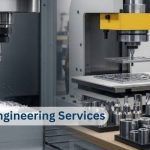How to Choose a CNC Turned Parts Supplier for High-Quality & Custom Components
The machined parts, fabricated to develop specialized components, are the key to the countless products in the current manufacturing industry with its dynamic environment. It all comes down to CNC turning- a process of making exactly formed cylindrical parts. Other nations, such as Germany, have, over the years, been at the forefront of conquering the world through CNC machining due to their high standards of manufacturing and excellent engineering. The selection of the appropriate CNC turned parts supplier is a critical business move. It has a direct effect on the quality of products, cost efficiency, and schedules.
This guide will discuss the key elements to consider: quality, certifications, lead times, and technical support so that you can select a vendor who is a leader in CNC turning services.
What are CNC turned parts?
CNC turning is a subtractive manufacturing technique whereby a computer-controlled lathe produces cylindrical components. During this operation, raw material or stock is rotated at high speed on the lathe as a fixed cutter cuts off material to form the part to high degrees of precision. The process lends itself in particular to machining rotationally symmetric pieces.
Turned metal components are often made of the following materials:
- Aluminum: a light and extremely powerful material, which finds use in the aerospace industry and electronics.
- Brass: Suited to all fittings, connectors, and plumbing material because they are machinable and have good corrosion resistance.
- Steel & Stainless Steel: High-strength shafts, fasteners, and parts of industrial machinery are made of this.
- Plastics: Insulators, spacers, and parts used in the medical field are made of Delrin, PEEK, and Nylon.
It is this process that is the default when it comes to producing everything from simple shafts and spacers to complex fittings and bushings, and as such, this forming has formed the core of precision parts manufacturing.
The Industries That Depend on the CNC Turned Parts
The application of CNC turning may be versatile and rather accurate; hence it is invaluable in a broad range of industries:
- Automotive: Engine parts, transmission shafts, bushings and axles used in automotive applications are common applications that demand very tight CNC tolerances of reliable engine parts.
- Medical Products: Surgical Instruments, implant-grade components, and fluid connectors require precision machining to guarantee patient safety and to ensure effective functionality, and hence a medical-grade components supplier is central.
- Aerospace: Aerospace CNC suppliers produce high-strength, lightweight parts such as hydraulic fittings, engines, and structural pins using the most stringent of quality standards.
- Industrial Machinery: Industrial CNC applications produce bearings, valves, and fasteners for heavy equipment to bear the enormous pressure and extend the life of machinery.
Advantages of the Use of a CNC Supplier with Experience
Coordinating with the appropriate professionals does not give one a fabricated part but a strategic advantage.
- Uniformity in size and tolerances: Sophisticated machining specialists or professionals who have experience in CNC machining have the level of knowledge and technology to perform tight tolerance machining, which makes all the parts exact copies and useful.
- Economies of scale: The ability to craft and generate the right tools and properly develop code allows for reducing material scrap and time, leading to lower costs in mass CNC production.
- Customization: An experienced supplier will be ready to deal in complex, unique designs or mass production, which means highly customized CNC solutions, on your terms.
- Technical support and DFM (Design for Manufacturability) advice: Your new best friends should include technical support and DFM advice, as they could lead to a cost and performance optimization of your part even before production.
What to Ask Before Selecting a CNC Turned Parts Supplier
When concluding a decision, you should ask yourself the following questions:
Q1. Are they able to offer material traceability?
Ans. You must ensure that the supplier utilized the raw materials which you ordered.
Q2. What are the tolerances and surface finish on them?
Ans. Get to know what they are capable of when it comes to both producing certain surface finish machining and the accuracy of dimensions.
Q3. Does it do prototyping?
Ans. An organization that is able to manufacture CNC prototype parts is of value in R&D and design verification.
Q4. What is their average turnaround?
Ans. Find out their lead time for prototypes and production runs, so you know they can accommodate your schedule to quickly turn around CNC machining.
Frequently Asked Questions
Q1. CNC turning vs CNC Milling?
Ans. In CNC turning, a stationary cutting tool turns the machine while the workpiece is rotated and material is removed to create cylindrical subparts. As opposed to that, CNC milling employs a spinning cutting tool that travels over an immobile workpiece to outline shapes, drill holes, and produce detailing. The two are useful when it comes to the production of complex machined structures.
Q2. So what is DFM and why is it critical?
Ans. DFM is short for Design for Manufacturability. It is important since the engineer of the supplier reads and analyzes your part design. They propose to simplify it, make it less costly, and more efficient in the manufacturing business, while not touching the performance.
Q3. How should the average lead time of CNC turned parts be?
Ans. Lead times will differ significantly depending on the level of complexity of the part involved, the materials, and the quantities of parts. Also, the capacity of the supplier determines lead times. Regardless of the anticipated use, CNC prototype pieces or mass production output, a stable vendor ought to give a transparent and reliable quotation.
Q4.What is the significance of such certifications as ISO 9001 to a CNC supplier?
Ans: Quality standards such as ISO 9001:2015 allow one to know that the provider uses a quality management system that is efficient and internationally accepted. This helps to provide the same procedures, quality control, and continual change. Consequently, you should have the assurance of their products and services.
Conclusion
The process of choosing who is going to supply you with the CNC turned parts is a big decision that will determine the quality, reliability and cost of your finished product. By ensuring that your components are the best in the market, you will be able to gain this. When choosing a high-capability partner, first consider engineering know-how and related quality certification, ideally a German-based partner given their engineering precision and manufacturing prowess, ISO 9001:2015 second, a proven track record.
Select between vendors due to skills in technology, reliability of quality, and the ability to produce in single quantities all the way up to mass production.
Looking to find a quality CNC turned parts supplier that can provide service and caliber that is second to none? Get a quote and call us now to discuss how we can make your next project a reality, a project with German-grade quality and perfection at its heart.

 Previous Post
Previous Post Next Post
Next Post